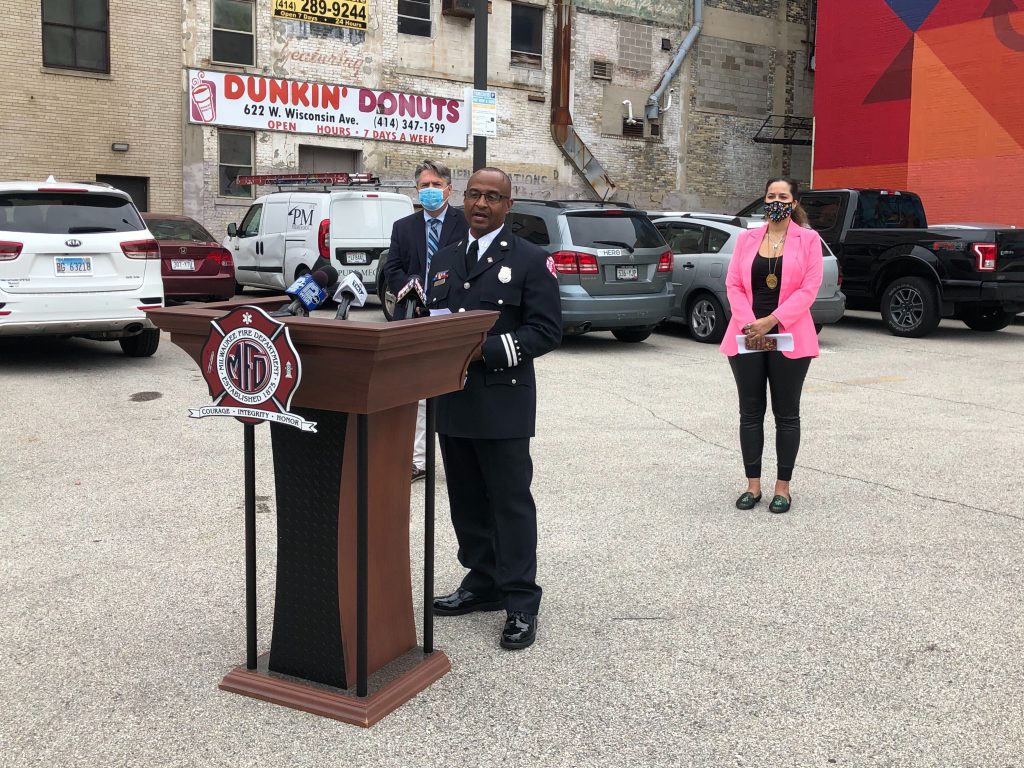City Expands Program To Fight Overdoses
Housed in fire department, the MORI program aims to reduce drug addiction, overdoses.
The City of Milwaukee continues to expand a program targeted at helping those affected by drug overdoses.
Housed within the Milwaukee Fire Department, the Milwaukee Overdose Response Initiative (MORI) is a partnership between the fire department, Milwaukee Health Department and a number of community partners aimed at finding help for those impacted by drug overdoses.
The initiative attempts to meet people where they are. The funding goes to support the MFD and peer support counselors from community partners making follow-up visits. It also pays for things like free rides from transportation network company Lyft to treatment facilities. MFD captain Michael Wright said the rides are an important tool to get people the help when they need it.
The city has now been awarded an additional $500,000 grant to extend the program through July 2021 from the Centers for Disease Control and Prevention via the National Association of County and City Health Officials. The funding builds on a 2019 grant of $735,000 from the organization.
But officials are confident MORI is making an impact, even after temporarily pausing to figure out how to provide care during the pandemic.
“We’ve seen now over 60 individuals take advantage of that program since the inception,” said Alderman Michael Murphy in a press conference Tuesday. “That’s 60 lives that quite honestly wouldn’t be here today if we didn’t have that program in place.”
Twenty-six people have gone the full way through the program. “Although that number is not a huge number, I look at it as the potential to save 26 lives,” said Mayor Tom Barrett.
Wright, who will retire in the coming weeks, said the city has learned a lot about treatment beyond simply applying naloxone (Narcan) to reverse an overdose and is now focused on addressing the underlying issues. Back in 2019, Murphy said the city’s follow-up efforts amounted to handing an individual a postcard-sized note with a phone number on it as they left the ambulance.
Now care services are coordinated in partnerships with groups like Community Medical Services, WisHope and CleanSlate Milwaukee and follow-up visits are made.
The effort is based out of MFD Station 31 at 2400 S. 8th St. in the city’s Lincoln Village neighborhood. “What it allows is really a case worker to ride with our paramedics,” said Health Commissioner Jeanette Kowalik, speaking before she announced her resignation Wednesday morning.
“We recognize there is more to be done,” she said. “There is a greater need right because of the general state of affairs in our nation.” Wright compared the opioid crisis and COVID-19 pandemic occurring at the same time to August’s Hurricane Laura and 2005’s Hurricane Katrina hitting simultaneously.
Wright said what is currently being executed is “MORI 3.” The first two iterations were focused on those experiencing non-fatal overdoses, but funding now allows for an individual to be housed within the Milwaukee County Medical Examiner‘s office and follow-up on those impacted by fatal overdoses. That includes children or others present in the house when the overdose occurred.
“All these resources that existed all this time will be used to end the cycle of recidivism,” he said. “I think the secret sauce was no one could have pulled everyone together like the fire department.” In 2019 he said the effort was getting organizations that operate as competitors to work together.
If you think stories like this are important, become a member of Urban Milwaukee and help support real, independent journalism. Plus you get some cool added benefits.
More about the Opioid Crisis
- Milwaukee County Executive David Crowley Announces Over $9 Million for Initiatives to Combat Opioid Epidemic - County Executive David Crowley - Jul 17th, 2025
- AG Kaul, 45 Other Attorneys General Plan to Join $720 Million Settlement with Eight Opioid Drug Makers - Wisconsin Department of Justice - Jul 14th, 2025
- Attorney General Kaul Announces Consent Judgment with Kroger Over Opioid Crisis - Wisconsin Department of Justice - Mar 21st, 2025
- Baldwin Votes to Strengthen Penalties, Step Up Enforcement Around Deadly Fentanyl - U.S. Sen. Tammy Baldwin - Mar 17th, 2025
- Wisconsin Communities Get Millions From Opioid Settlement as Deaths Decline - Evan Casey - Mar 1st, 2025
- MKE County: County Creates Easy Public Access To Overdose Data - Graham Kilmer - Feb 18th, 2025
- Milwaukee County Executive David Crowley and the Office of Emergency Management Launch New Overdose Dashboard - County Executive David Crowley - Feb 18th, 2025
- Fitzgerald Advances Legislation to Fight Opioid Epidemic - U.S. Rep. Scott Fitzgerald - Feb 6th, 2025
- Milwaukee Is Losing a Generation of Black Men To Drug Crisis - Edgar Mendez and Devin Blake - Jan 31st, 2025
- Milwaukee County’s Overdose Deaths Declined For Second Straight Year - Evan Casey - Jan 27th, 2025
Read more about Opioid Crisis here
Political Contributions Tracker
Displaying political contributions between people mentioned in this story. Learn more.
























